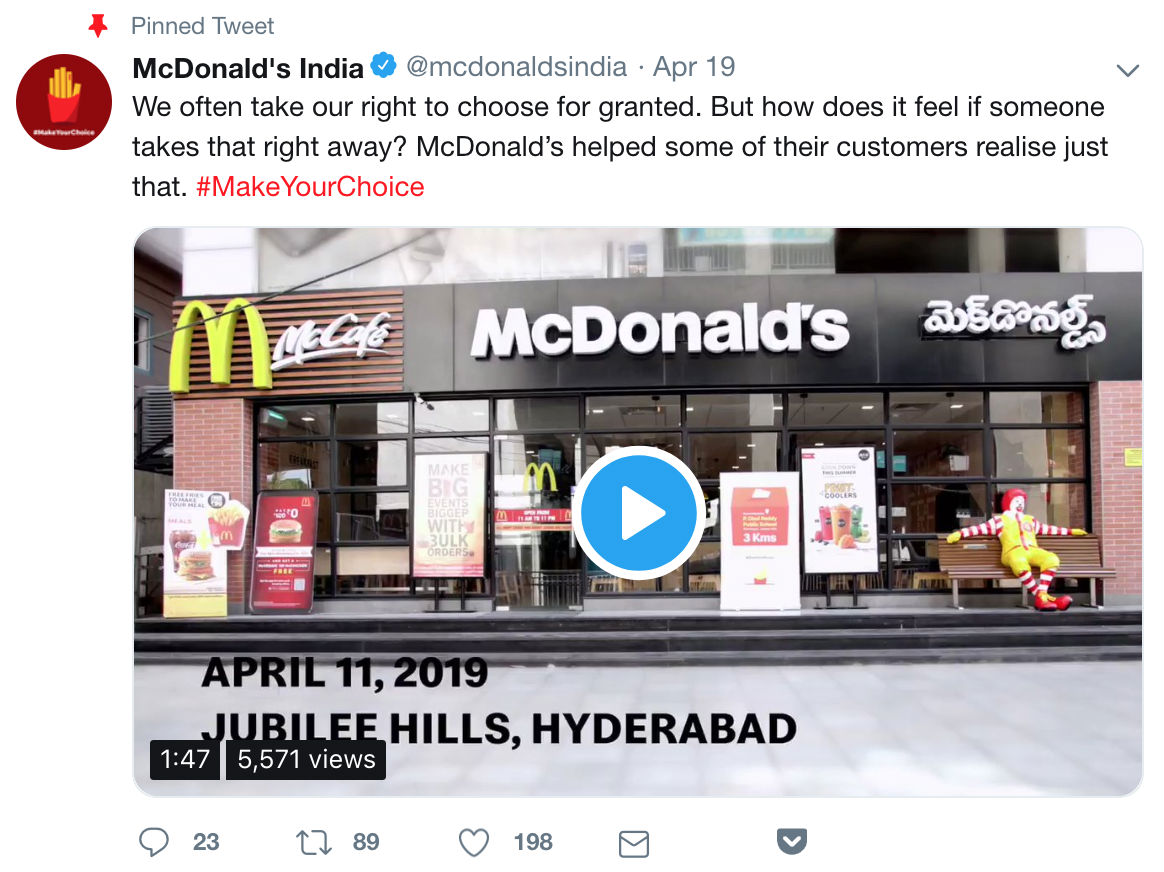
The first time I saw the McDonald’s Hyderabad ‘candid camera stunt’ teaching Indians the importance of voting, I had mixed feelings.
On one hand, I was immediately reminded of McDonald’s perennial tormentor, Burger King, and its smashingly original Whopper Neutrality campaign (by the agency, David).
The core idea seems very similar – when customers come and ask you to deliver their choice, you dither and do something else.
Besides the irony of an American corporation (Indian unit, of course) teaching Indians the importance of choosing a candidate (and hence seems condescending, from that angle), it has other angles to consider.
[1] The customer service angle
Establishments like McDonald’s have something called ‘Right to admission and service reserved’, meaning they can deny serving someone based on the rules (reasonable) formulated by them, and as long as it doesn’t contravene Article 15 of the Constitution: “No citizen shall, on grounds only of religion, race, caste, sex, place of birth or any of them, be subject to any disability, liability, restriction or condition with regard to – (a) access to shops, public restaurants, hotels and places of public entertainment”.
But McDonald’s doesn’t deny service in this stunt. It actually gives the customer something else and not what was specifically sought. That, however clever it may seem under the campaign’s objective, is simply terrible customer service, if seen from a broader light. There is a Burger King next door, I’m sure, that would be willing to give the customer what he/she wants. Plus, it is McDonald’s, not a life-saving medicine. I’d imagine at least one customer (if the stunt really had actual customers; it is most likely filled with actors and models who know the script and are merely acting) would have told McDonald’s, ‘Seriously? Keep your burger with you. Let me pick my food from the shop next door‘.
[2] The ‘Voting as a right’ angle
‘Voting’ is a right, and not a duty, as far as I know.
Article 51A of the Indian Constitution lists 11 Fundamental Duties of every Indian citizen. They are:
- To abide by constitution and respect its ideal and institutions, the National Flag and National Anthem.
- To cherish and follow the noble ideals which inspired our national struggle for freedom.
- To uphold and protect the sovereignty, unity and integrity of India.
- To defend the country and render national service when called upon to do so.
- To promote harmony and the spirit of common brotherhood amongst all the people of India transcending religious, linguistic and regional or sectional diversities; to renounce practices derogatory to the dignity of women.
- To value and preserve the right heritage of our composite culture.
- To protect and improve the natural environment including forests, lakes, rivers and wildlife, and to have compassion for living creature.
- To develop the scientific temper, humanism and the spirit of inquiry and reform.
- To safeguard public property and to abjure violence.
- To strive towards excellence in all spheres of individual and collective activity so that the nation constantly rises to higher levels of endeavour and achievements.
- A parent or guardian to provide opportunities for education to his child or as the case may be, ward between the age of 6 and 15 years. (added by the 86th Constitutional Amendment Act of 2002)
When it is a right, it also includes not enforcing that right, for whatever reason. If it was a duty, like paying taxes, there would be guidelines on penalty for not performing that duty. With voting, there is none.
That doesn’t mean we can argue to make it compulsory either, because a large section of the population would be penalized for reasons beyond their control. Like people who have had their vote cast by another person, illegitimately. If there was a penalty for not voting, then applying those penalties (flowing from citizenship-based benefits) would be denied to people who have their names missing or removed from the voter’s list, or those who had other perfectly valid reasons for not voting. Such omissions should be taken into account while considering making voting mandatory.
Now, consider the McDonald’s stunt in this light. Should the brand be penalizing a person who was denied his vote because someone else had used it before him/her, or who went to the polling booth and found her/his name missing in the voter’s list? No burger of his/her choice for them? That just seems stupendously silly. The gimmick video makes a sweeping binary assumption about not voting – those who want to and did, and those who did not want to and didn’t.
If you compare the Burger King Whopper Neutrality video, it was thought through from a very nuanced angle, in explaining the ill effects of not adhering to net neutrality. All those nuances go out of the window in the McDonald’s stunt.
Even McDonald’s post on social media is misleading.



It says, “We often take our right to choose for granted. But how does it feel if someone takes that right away? McDonald’s helped some of their customers realise just that”. That’s actually ‘Right to Vote’, which includes, by the very word ‘right’, a right not to vote too. If there was no choice, it wouldn’t be a right in the first place.
Ironically, if the candidate you voted for doesn’t win, that would, in simpler terms, feel like the wrong burger delivered to you instead of the one you asked for (that’s democracy 101 for you. Thankfully, that’s not how commercial business operates). The analogy works far better in that case than the misleading ‘right to choose’.
[3] The marketing narrative/story-telling angle
Given the above 2 angles, it is clear that you cannot threaten (or deny something, in this case) citizens and force them into submission… to vote. Imagine the Government of India using this tactic – ‘Vote, or else your passport will be given second priority to those who have voted’, or ‘Vote, or else the rate at which you can get electricity will be a higher slab’. Those attempts would immediately be thrown out of the court.
Season 4 of the US TV show Billions (episode 8) actually features a plot point of using blockchain-enabled mobile phone based voting! Perhaps when mobile phone technology is secure enough, we could consider compulsory voting and its penalty vectors. But at this point, the narrative is not based on denial; it is instead based on incentives.
In marketing terms, consider the insurance sector.
Denial-based narrative is to scare the consumers about what they won’t get if they do not opt for insurance, and convince them using a negative angle.
The incentive-based narrative is to tell them the benefits of insurance and convince them positively.
This is why many shops use free food as an incentive when you show your inked finger. But I suppose McDonald’s and its agency DDB Mudra wanted to stand out from the clutter of election-based marketing gimmicks and went bazooka on the Indian citizen, albeit for fun. But ‘fun’ on a citizenship right (not a duty, remember) is not so much fun if you think about it from that point of view.
Given how viral that stunt went, I’m sure a lot of people did not want to think of the nuances and liked it simply for what they saw.
I’m most definitely not a fan of this particular stunt.
You, of course, have the right to be a fan of the gimmick 🙂
